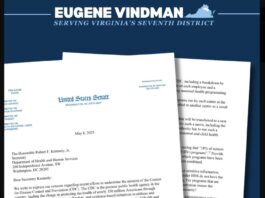by Paul Goldman
While the Hampton University Poll is new, it surely seems to be the best one this year based on the quality of their work. They have TMAC up 6, slightly above Quinnipiac, not the Post’s +12. With all due respect, the Washington Post poll, showing TMAC with a record double-digit lead for a VA DEM guv guy, assumed an electorate which had a record low number of self-identified Republicans. This in turn, produced an electorate with a +8% Democratic lean – that is to say 8% more self-identified Democrats than Republicans. Thus the Post is assuming the gubernatorial year partisan split will basically match the presidential year (+7 Democrat) divide. Moreover, the poll also projects a record low number partisan identifying voters (56% would be D’s and R’s), meaning a record high percent of independents, well north of 40%.
True, the Post electorate projection might be right. BUT: While this might be a reasonable electorate projection for a poll in 2014 AFTER this type of divide ACTUALLY occurred on November 5th, 2013, it isn’t reasonable right now. Especially since the Post has been so hard on Mr. Cuccinelli for so long this year, the toughest attack on any GUV candidate EVER.
All things considered, the Post might best have done the poll over and eaten the cost. Or weighted the results to a more historically defensible equation. According to the Hampton Poll, the joke candidate Sarvis could cost Cuccinelli possibly 2-3 full percentage points if Virginians actually are serious about voting for this guy. Indeed, the Hampton Poll picks the fact Sarvis – and this does seem to be true – is getting an amazing vote in Central Virginia.
As I co-wrote in the Washington Post column Sunday, Cuccinelli has faced more chess board hurdles than any GUV candidate in memory, the Sarvis joke factor simply another although generated in large measure by many Republican and independent voters being turned off the Cuccinelli campaign. Bad luck in one sense as we wrote Sunday, but Cuccinelli only has his campaign to blame in a far larger measure.
Back to the polls: At 200-proof we don’t punt or hedge, we call the play on the field, and if you got to throw the flag and call a penalty, you do it. The Post Poll, using a +8 Democratic electorate with record low Republicans, is simply a biased poll by any fair definition here in October/2013. It isn’t a question of whether it turns out to be true or not: it simply isn’t a fair statistical model based on historical voting patterns and that needs to be said.
BOTTOM LINE: If you want a good poll, then I recommend the Hampton University Poll. But it would be good also to read the Q-Pac poll, since it is the first in the heat of the campaign to actually predict growing interest among Republicans this year. While within the margin of error, this is the first poll to say more Republicans will vote than Democrats. But it has the Democratic vote, as part of the electorate, LESS than in 2009.
Historically, there has been a trend at the end, more times than not, toward Republicans. But the Quinnipiac pollsters don’t tell us where this GOP rush is coming from. Did the Bloomberg million dollar buy, the Clinton “full on” for McAuliffe arouse Republicans somehow, giving them something to vote against since Cuccinelli has the highest negatives in history of any GUV candidate.
Historically speaking, all things considered, the Hampton Poll is the most balanced on a technical basis in my view at this point in time. A lot of stuff can happen in a week, and on election day, you never know. That’s why they still have to count the ballots. But while I stick with my analysis in the Post and over the year – Democrats have had the advantage and they should sweep – the Quinnipiac Poll could be a warning, as it shows TMAC’s image having deteriorated over the course of the campaign badly, although not as badly as Cuccinelli’s.
Long story short: The fact that the Cuccinelli campaign failed to use a biased Post poll as a political dart board is baffling, since that is the easy play really given his coalition. They will seize on the Q-Pac poll, as it is the best polling news they have received in months, and right at the end of the campaign to boot.
BUT AS A TECHNICAL MATTER, the Hampton Poll again strikes me as the most balanced right now in technical, professional terms. As I have written repeatedly, the “horse race” numbers are of the least interested to me, although of the most interest to the press and to most writers. However, the “horse race” standing is DERIVATIVE. The way you vote is based on your view of the candidates, not the other way around.
The Hampton Poll is projecting a slightly Democratic lean to the electorate, which is where the race is RIGHT NOW in my view.
Among white Republicans, 1 in 5 have a negative view of Cuccinelli! Among white Democrats, only 1 in 10 have a negative view of McAuliffe. This is why the Hampton Poll correctly shows 2013 has been basically a TURNOUT ELECTION, not like most recent GUV races where an issue decided to contest. It is the negative view of Cuccinelli among voters usually open to a GOP GUV candidate that makes his job of winning on election day so hard.
Roughly 1/3 of the electorate will be older white voters self-identified as retired. Given Republicans are having trouble with younger voters who tend also to be newer or less regular ballot casters, any GOP GUV candidate has got to have a strategy to max his or her voter among these older Virginians. A guy like Cuccinelli can’t make up from another voter pool losses among voters who he should have been able to win over.
The Hampton Poll shows that for all the talk about his gender gap problems, Cuccinelli’s image among single white men and women is roughly the same. Rather, trying to do some deductive reasoning fast, the Hampton Poll suggests his problem is with married white older female voters, in theory the ones he thinks are most receptive to his traditional social issues agenda. NOT!
In part this seemingly has to true due to the fact older white Democrats and white Democratic-leaning independents are rejecting Cuccinelli to the max, contrary to McDonnell, Allen and Gilmore, the recent GOP winners. That is to say: These Democrats have been constantly warming to TMAC and increasingly colder toward Cuccinelli. Thus, you begin to see Cuccinelli’s TURNOUT PROBLEM, when you add the fact that his negative image among Republicans is on the statistically high side.
The Hampton Poll shows that among older white voters of retirement age, Cuccinelli and TMAC have the same basic image among this important posse of voters. This is driven by the analysis above in large measure. Since these folks vote regularly, to win he either needs to change their minds in 6 days or find a way to motivate either a lot of Republicans not all that interested in voting this year and/or a whole new group of Virginians who generally don’t vote in a GUV year or are new to voting.
A candidate who can’t expand his base like McDonnell in 2009 – he got a lot of voters who were positive toward President Obama – can only win with a big relative turnout of such partisan or partisan leaning voters who are prone to voting or a whole new slice of voters.
Conclusion: You can take the Hampton Poll and the Q-Poll, then harmonize the results; they are indeed similar in important ways even if there are key differences. The actual horse race numbers are within the same statistical zone, namely TMAC has a modest but statistically significant lead.
The Sarvis joker card is there and most of his voters are in protest, not pro-Sarvis mode. History suggests half could switch to a major candidate, yet they have stayed with Sarvis for a long time in the polls now so maybe they are just going to go ahead and Vote No to the major party guys. T
This puts Cuccinelli in a difficult statistical bind since the younger first time voters aren’t likely to go his way, and his campaign stumbles cost $millions in contributions leaving him vulnerable to having no TV to influence remaining certain voters historically in expensive markets.
The Hampton Poll is good news for Mark Obenshain, since it suggests his image among voters is far stronger than Mark Herring’s. As I have written on this page, a Democratic ticket push would be very helpful to Herring. The AG’s race is a lot closer than it should be. But the Q-poll along with Hampton, suggests the GOP still has some non-presidential year advantages, at least down ballot, for a credible candidate.
If the GOP can somehow engender a turnout push in the closing the days, then Obenshain’s TV advantage might prove effective. The AG’s race is a mystery to me.
But the Republican’s father, iconic Richard Obenshain, was the best pure politician in the history of the modern GOP except George Allen in his prime. So maybe some of it rubbed off on Mark.
He has had a rope-a-dope strategy really, smiling for the camera, absorbing the blows, and then finishing with flourish. Herring is fighting back but this is a crazy year with a three way GUV contest.
Turnout will decide the AG’s race in the Hampton Poll and that seems correct. The Hampton Poll sets the marker. If Q-Pac is right, then a relative rise in GOP leaning voters can lift Obenshain to an amazing win really even as Cuccinelli falls considerably short. But if the Post is right and Democrats are going to start voting like it is 2016 already, then Herring wins with a decent margin.
A credible, positive closing argument by Cuccinelli might save Obenshain. My money is still on the sweep, predicted back in the Spring before the Democratic primary.
As they say in football, it always comes down to the basic block and tackling.



